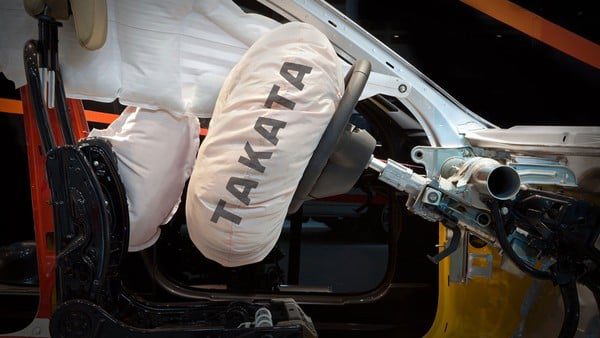Global Courant 2023-04-28 12:00:35
In the automotive industry, Takata encloses within its six-letter name one of the great emblems of road insecurity. What a paradox, it was for years the world’s largest provider of airbags, the airbags that must be prepared to protect drivers and passengers of cars in a crash.
In the case of the products this Japanese giant sold, airbags were deadly. And they still are, because five years after the company’s closure, there are millions of vehicles on the planet equipped with the traps that these devices represent.
Takata is an unprecedented industry drama, involving 19 manufacturers with 34 brands selling vehicles with faulty airbags. The business was so monumental that, at its peak, one in five airbags that were placed in the world were manufactured by the Japanese company.
In the last 10 years, more than 100 million airbags have already been withdrawn. To date, explosions from these airbags have claimed around 40 lives, while injuring around 500 people across the globe. At present, the calls for review of the different brands that had the Japanese as suppliers do not cease.
A Honda technician -one of the brands that recorded the most incidents- checks the device that fails in the Takata airbags. EUTERS/Joe Skipper
The genesis of the deadly scandal dates back to 2004, according to a meticulous journalistic investigation carried out in 2014 by The New York Times to disclose the seriousness of the situation in the face of the appearance of cases of injuries caused by airbags.
When did the fatal Takata failure originate?
The “vehicle zero” of the problem is difficult to identify. Although the first cases began to come to light in 2013, the affected models were manufactured many years ago, and in Argentina there are some from the 90s that have been recalled by manufacturers.
In fact, the last death related to a defective Takata airbag was recorded in December 2022 in Bowling Green, Kentucky, United States. He was with a driver of a 2002 Honda Accord, as confirmed by the National Highway Traffic Safety Administration (NHTSA), an entity that oversees the safety of vehicles in that country.
While the issue dates back decades (models from the 1990s have been reviewed), even today many auto conglomerates, including Honda, Toyota, Stellantis, Ford, General Motors, and Volkswagen, still try to reach their drivers through of different campaigns of free recall in official workshops to correct the problem.
Takata airbags can explode pieces of metal that injure vehicle occupants when they explode.
In some cases, the call became a stark warning: “Don’t drive your car.” Thus, they offer special services for the collection and return of the unit at the owner’s home. And others even offer monetary rewards: they pay their customers to go and change their airbags, just like General Motors does in Argentina.
What was Takata’s problem
The airbags of a car explode when there is a crash, and this is thanks to an activator that produces the explosion. In Takata’s defective airbags, there is a part that breaks in a way not intended by its designers, that is, incorrectly, which results in pieces of metal being shot next to the airbag into the passenger compartment.
To get an idea of how dangerous this can be, an airbag typically explodes at a speed of 250 km/h, so any piece of metal fired at that speed is potentially deadly under any circumstances.
Takata went bankrupt in 2017 and closed a year later.
Now, at a technical level, the origin of the problem was the use of ammonium nitrate, a highly oxidizing chemical compound that is used in industry and the military as a controlled detonation explosive. This, used by Takata to trigger its airbags, when exposed to high temperatures and humidity levels, deteriorates and causes landslides.
Perhaps even more damaging, however, was Takata’s handling of the problem once its airbags were faulty. Half-truths with suppliers, untruthful internal cross-communications and a late recall have cost the lives of around 40 people around the world to date.
Takata and the situation in Argentina
The last recall by an automaker in Argentina was made on April 21, 2023, when Audi summoned 54 owners of TT and R8 models, manufactured in Germany between 2016 and 2020. Although it does not speak exhaustively of Takata , the Japanese brand flies over the problem.
“Volkswagen Argentina, Audi Division, has detected the possibility that a batch of gas generator used in the driver’s side frontal airbag system may degrade after long periods of vehicle exposure to high temperatures, large thermal amplitudes and high relative humidity of the air”, says the notice published in graphic media.
Another of the current recall campaigns is that of Chevrolet Argentina, which on its website is blunt: “Don’t drive your Classic or Celta anymore, just do it to go to a Chevrolet workshop. Avoid serious and even fatal consequences.
Audi TT, one of the models that were recalled in Argentina.
In addition to the free replacement of the airbag for 2013 to 2017 models of these vehicles, whose stipulated work time, according to the brand, is 30 minutes, whoever takes their vehicle will receive $10,000 “to spend as you want.”
For its part, the local subsidiary of Honda, one of the automakers with the largest number of cases of defective Takata airbags, mainly due to its sales volume in the United States, calls for review on its website of “all vehicles manufactured between 2001 and 2014”, although it also identifies as “potentially affected vehicles” Civic models from 1996 to 2014, Accord, from 1998, CR-V, from 1997 to 2000 and Odyssey from 1998 to 1999.
The largest bankruptcy suffered by a Japanese manufacturer The scandal was uncovered in November 2014, thanks to a report published by The New York Times. Former employees of the firm’s subsidiary in the United States, those who worked at the Auburn Hills plant in the state of Michigan, were cited as a source.
According to these testimonies, Takata hid the danger of its airbags since 2004, which had been exposed in a series of secret tests carried out to verify if any previous incidents had originated from failures in its products.
Chevrolet Classic owners are paid by General Motors to stop by their shops to change their airbags.
The forceful result was hidden for a decade, during which Takata maintained the normal supply to its customers. It is estimated that the fatalities are already more than 40: at the end of 2017 there were 37, to which were added five declared in 2022 only in the United States, according to official data from the NHTSA.
Four years after the first recalls took place, Takata filed for bankruptcy in June 2017. The reason is clear: the absolute loss of credibility that has cost it a major crisis of confidence in almost every automaker in the world. world, added to debts of more than US$8,000 million due to sanctions and compensation that it had to face for its defective airbags.
Founded in 1933 for the production of textiles and supplies for parachutes, in the 1950s it began to get involved with the automotive industry from the manufacture of seat belts. In 1988 it began manufacturing airbags. Today, nine decades after its opening and 45 years after the production of airbags began, Takata remains the symbol of millions of time bombs that remain installed in many cars.








